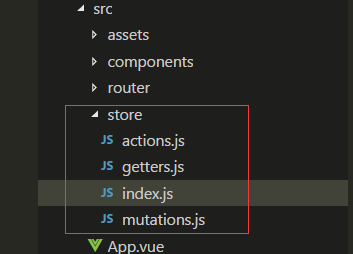vuex最詳細完整的使用用法 vuex最詳細完整的使用用法
阿新 • • 發佈:2018-12-05
原
vuex最詳細完整的使用用法
2018年03月01日 15:05:10 飛歌Fly 閱讀數:1228為什麼使用vuex?
vuex主要是是做資料互動,父子元件傳值可以很容易辦到,但是兄弟元件間傳值(兄弟元件下又有父子元件),或者大型spa單頁面框架專案,頁面多並且一層巢狀一層的傳值,異常麻煩,用vuex來維護共有的狀態或資料會顯得得心應手。
需求:兩個元件A和B,vuex維護的公共資料是 餐館的名稱 resturantName,預設餐館名稱是 飛歌餐館,那麼現在A和B頁面顯示的就是飛歌餐館。如果A修改餐館名稱 為 A餐館,則B頁面顯示的將會是 A餐館,反之B修改同理。這就是vuex維護公共狀態或資料的魅力,在一個地方修改了資料,在這個專案的其他頁面都會變成這個資料。

①使用 vue-cli腳手架工具建立一個工程專案,工程目錄,建立元件A和元件B路由如下:
路由如下:
- import Vue from 'vue'
- import Router from 'vue-router'
- import componentsA from '@/components/componentsA'
- import componentsB from '@/components/componentsB'
- Vue.use(Router)
- export default new Router({
- mode: 'history',
- routes: [
- {
- path: '/',
- name: 'componentsA',
- component: componentsA
- },
- {
- path: '/componentsA',
- name: 'componentsA',
- component: componentsA
- },
- {
- path: '/componentsB',
- name: 'componentsB',
- component: componentsB
- }
- ]
- })
app.vue
-
<template>
-
<div id="app">
-
<router-view/>
-
</div>
-
</template>
-
-
<script>
-
export
default {
-
name:
'App'
-
}
-
</script>
-
-
<style>
-
#app {
-
font-family:
'Avenir', Helvetica, Arial, sans-serif;
-
-webkit-font-smoothing: antialiased;
-
-moz-osx-font-smoothing: grayscale;
-
text-align: center;
-
color:
#2c3e50;
-
margin-top:
60px;
-
}
-
</style>
②開始使用vuex,新建一個 sotre資料夾,分開維護 actions mutations getters
②在store/index.js檔案中新建vuex 的store例項
*as的意思是 匯入這個檔案裡面的所有內容,就不用一個個例項來匯入了。
- import Vue from 'vue'
- import Vuex from 'vuex'
- import * as getters from './getters' // 匯入響應的模組,*相當於引入了這個元件下所有匯出的事例
- import * as actions from './actions'
- import * as mutations from './mutations'
- Vue.use(Vuex)
- // 首先宣告一個需要全域性維護的狀態 state,比如 我這裡舉例的resturantName
- const state = {
- resturantName: '飛歌餐館' // 預設值
- // id: xxx 如果還有全域性狀態也可以在這裡新增
- // name:xxx
- }
- // 註冊上面引入的各大模組
- const store = new Vuex.Store({
- state, // 共同維護的一個狀態,state裡面可以是很多個全域性狀態
- getters, // 獲取資料並渲染
- actions, // 資料的非同步操作
- mutations // 處理資料的唯一途徑,state的改變或賦值只能在這裡
- })
- export default store // 匯出store並在 main.js中引用註冊。
③actions
- // 給action註冊事件處理函式。當這個函式被觸發時候,將狀態提交到mutations中處理
- export function modifyAName({commit}, name) { // commit 提交;name即為點選後傳遞過來的引數,此時是 'A餐館'
- return commit ('modifyAName', name)
- }
- export function modifyBName({commit}, name) {
- return commit ('modifyBName', name)
- }
- // ES6精簡寫法
- // export const modifyAName = ({commit},name) => commit('modifyAName', name)
④mutations
- // 提交 mutations是更改Vuex狀態的唯一合法方法
- export const modifyAName = (state, name) => { // A元件點選更改餐館名稱為 A餐館
- state.resturantName = name // 把方法傳遞過來的引數,賦值給state中的resturantName
- }
- export const modifyBName = (state, name) => { // B元件點選更改餐館名稱為 B餐館
- state.resturantName = name
- }
⑤getters
- // 獲取最終的狀態資訊
- export const resturantName = state => state.resturantName
⑥在main.js中匯入 store例項
-
// The Vue build version to load with the `import` command
-
// (runtime-only or standalone) has been set in webpack.base.conf with an alias.
-
import Vue from 'vue'
-
import App from './App'
-
import router from './router'
-
import store from './store'
-
-
Vue.config.productionTip = false
-
-
/* eslint-disable no-new */
-
new Vue({
-
el: '#app',
-
router,
-
store, // 這樣就能全域性使用vuex了
-
components: { App },
-
template: '
<App/>'
-
})
④在元件A中,定義點選事件,點選 修改 餐館的名稱,並把餐館的名稱在事件中用引數進行傳遞。
...mapactions 和 ...mapgetters都是vuex提供的語法糖,在底層已經封裝好了,拿來就能用,簡化了很多操作。
其中...mapActions(['clickAFn']) 相當於this.$store.dispatch('clickAFn',{引數}),mapActions中只需要指定方法名即可,引數省略。
...mapGetters(['resturantName'])相當於this.$store.getters.resturantName
-
<template>
-
<div class="componentsA">
-
<P class="title">元件A
</P>
-
<P class="titleName">餐館名稱:{{resturantName}}
</P>
-
<div>
-
<!-- 點選修改 為 A 餐館 -->
-
<button class="btn" @click="modifyAName('A餐館')">修改為A餐館
</button>
-
</div>
-
<div class="marTop">
-
<button class="btn" @click="trunToB">跳轉到B頁面
</button>
-
</div>
-
</div>
-
</template>
-
-
<script>
-
import {mapActions, mapGetters}
from
'vuex'
-
export
default {
-
name:
'A',
-
data () {
-
return {
-
}
-
},
-
methods:{
-
...mapActions(
// 語法糖
-
[
'modifyAName']
// 相當於this.$store.dispatch('modifyName'),提交這個方法
-
),
-
trunToB () {
-
this.$router.push({
path:
'/componentsB'})
// 路由跳轉到B
-
}
-
},
-
computed: {
-
...mapGetters([
'resturantName'])
// 動態計算屬性,相當於this.$store.getters.resturantName
-
}
-
}
-
</script>
-
-
<!-- Add "scoped" attribute to limit CSS to this component only -->
-
<style scoped>
-
.title,
.titleName{
-
color: blue;
-
font-size:
20px;
-
}
-
.btn{
-
width:
160px;
-
height:
40px;
-
background-color: blue;
-
border: none;
-
outline: none;
-
color:
#ffffff;
-
border-radius:
4px;
-
}
-
.marTop{
-
margin-top:
20px;
-
}
-
</style>
B元件同理
-
<template>
-
<div class="componentsB">
-
<P class="title">元件B
</P>
-
<P class="titleName">餐館名稱:{{resturantName}}
</P>
-
<div>
-
<!-- 點選修改 為 B 餐館 -->
-
<button class="btn" @click="modifyBName('B餐館')">修改為B餐館
</button>
-
</div>
-
<div class="marTop">
-
<button class="btn" @click="trunToA">跳轉到A頁面
</button>
-
</div>
-
</div>
-
</template>
-
-
<script>
-
import {mapActions, mapGetters}
from
'vuex'
-
export
default {
-
name:
'B',
-
data () {
-
return {
-
}
-
},
-
methods:{
-
...mapActions(
// 語法糖
-
[
'modifyBName']
// 相當於this.$store.dispatch('modifyName'),提交這個方法
-
),
-
trunToA () {
-
this.$router.push({
path:
'/componentsA'})
// 路由跳轉到A
-
}
-
},
-
computed: {
-
...mapGetters([
'resturantName'])
// 動態計算屬性,相當於this.$store.getters.resturantName
-
}
-
}
-
</script>
-
-
<!-- Add "scoped" attribute to limit CSS to this component only -->
-
<style scoped>
-
<



